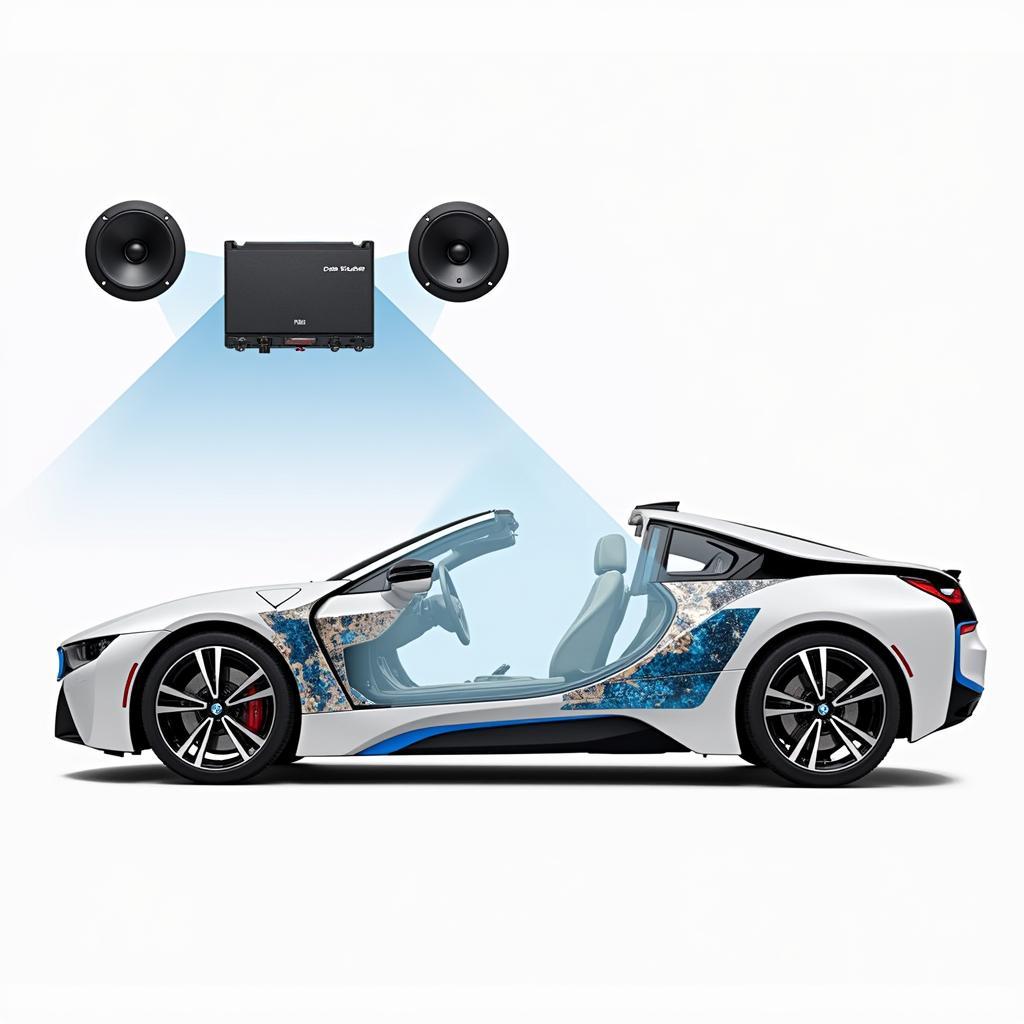The distinct bmw 320i sound of your vehicle can often be the first indicator of underlying mechanical issues. From a subtle purr to a concerning rattle, understanding these sounds is crucial for maintaining your BMW’s performance and longevity. This guide will explore common bmw 320i sound problems, their potential causes, and effective solutions.
Decoding Your BMW 320i’s Sounds
Your BMW 320i communicates through a variety of sounds, some normal and others indicative of problems. Identifying the specific sound is the first step in accurate diagnosis. Is it a whining, knocking, clicking, or perhaps a grinding sound? Each noise points to different potential issues.
Whining Sounds
A whining sound, especially noticeable when accelerating, can often indicate a problem with the power steering pump or a low power steering fluid level. It’s also possible the alternator is failing, producing a high-pitched whine. Another culprit could be a worn-out belt tensioner or idler pulley.
Knocking Sounds
Knocking sounds, particularly coming from the engine, are often a sign of serious trouble. This could indicate issues with the connecting rods, bearings, or pistons. Ignoring these sounds can lead to catastrophic engine failure. Low oil pressure or using the wrong type of oil can also contribute to knocking.
Clicking Sounds
Clicking sounds can stem from a variety of sources. A failing CV joint often produces a clicking sound, especially when turning. Other potential causes include worn-out wheel bearings, damaged brake pads, or a loose heat shield.
Grinding Sounds
Grinding noises are rarely good news. They can signify worn-out brake pads, issues with the transmission, or problems with the differential. If you hear grinding when shifting gears, it’s crucial to address the issue immediately to prevent further damage to the transmission.
Common Causes of BMW 320i Sound Issues
Several factors can contribute to unusual bmw 320i sound emanating from your vehicle. Understanding these common culprits is essential for effective troubleshooting.
Exhaust System Problems
A faulty exhaust system can lead to various noises, from a deep rumbling to a loud roar. Common issues include leaks in the exhaust manifold, cracks in the muffler, or a damaged catalytic converter. These problems can also affect engine performance and fuel efficiency.
Suspension Issues
Worn-out shocks, struts, or bushings in the suspension system can cause squeaking, rattling, or clunking sounds, particularly when driving over bumps or uneven surfaces.
Brake Problems
Squealing or grinding brakes are a telltale sign of worn brake pads. Ignoring these sounds can lead to damage to the rotors and calipers, resulting in costly repairs.
Troubleshooting and Solutions
Once you’ve identified the specific bmw 320i sound, you can begin the troubleshooting process. While some issues can be resolved with simple DIY fixes, others require professional expertise.
DIY Solutions
For minor issues like loose heat shields or worn-out belts, you might be able to perform the repairs yourself. However, always consult your owner’s manual before attempting any DIY repairs. Similar to the [bmw 320i sound system], diagnosing issues requires careful attention.
Professional Diagnosis and Repair
For more complex issues, such as engine knocking or transmission problems, it’s best to seek professional help. A qualified mechanic can accurately diagnose the problem using specialized diagnostic tools and perform the necessary repairs. If you are looking for an upgrade, check out the [bmw 7 series sound system].
Conclusion
Paying attention to your bmw 320i sound is essential for maintaining its performance and preventing costly repairs. By understanding the different types of sounds and their potential causes, you can address issues promptly and ensure a smooth and enjoyable driving experience. Don’t hesitate to seek professional help for complex issues, as early diagnosis and intervention are often key to preventing major problems.
FAQ
-
What does a whining sound in my BMW 320i indicate?
A whining sound can indicate a problem with the power steering pump, alternator, or belt tensioner. -
What should I do if I hear a knocking sound from the engine?
A knocking sound from the engine is a serious issue and requires immediate professional attention. -
Can I fix clicking sounds myself?
If the clicking is due to a loose heat shield, you might be able to fix it yourself. However, other causes like a failing CV joint require professional repair. -
Why are my brakes grinding?
Grinding brakes are usually a sign of worn-out brake pads. -
What can cause a rumbling sound from the exhaust?
A rumbling sound from the exhaust can indicate leaks in the exhaust manifold, a cracked muffler, or a damaged catalytic converter. -
What if my BMW 320i makes a clunking sound over bumps?
A clunking sound over bumps often indicates a problem with the suspension, such as worn-out shocks or struts. -
How can I prevent bmw 320i sound problems?
Regular maintenance, including oil changes and inspections, can help prevent many sound-related issues.
For further information on specific sound systems, you can refer to resources like [2014 bmw 320i sound system] and [bmw 320i exhaust sound]. If you are experiencing issues with your audio system, you may find the discussion on [2013 bmw 320i audio system sounds like shit] helpful.
When you need assistance, contact us via Whatsapp: +1 (641) 206-8880, Email: CARDIAGTECH[email protected] or visit us at 276 Reock St, City of Orange, NJ 07050, United States. Our customer service team is available 24/7.

